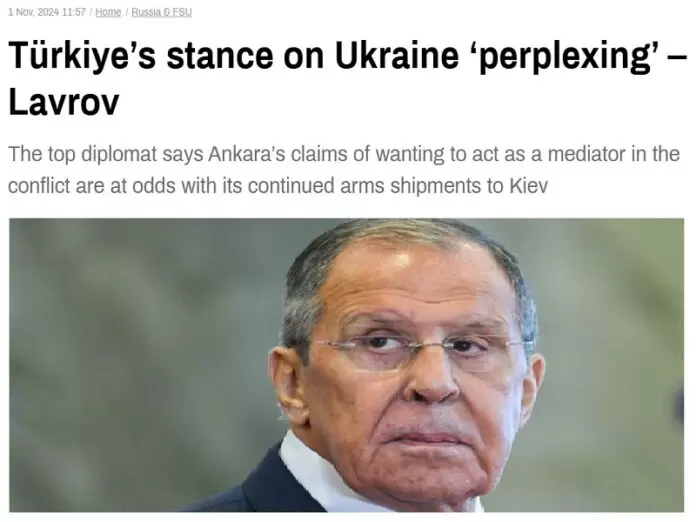Russian Foreign Minister Sergey Lavrov told Hurriyet in early November that he considers Turkiye’s approach to the Ukrainian Conflict to be “perplexing” since it’s facilitating peace talks while still arming Ukraine against Russia. Although not mentioned in the interview, another bone of contention between Moscow and Ankara is the latter’s insistence on recognizing Ukraine’s pre-2014 borders. This seemingly contradictory policy actually isn’t all that surprising if one takes the time to deeply reflect on it.
Like most countries nowadays, Turkiye prioritizes its national interests as its leadership sincerely understands them to be, to which end it believes that there are benefits to be had in balancing between the West-Ukraine and Russia. This takes the form of facilitating peace talks by serving as a neutral mediation platform, supporting the West-Ukraine by arming Kiev and recognizing its pre-2014 borders, and supporting Russia by defying the West’s unilateral sanctions regime against it.
For as difficult as it is to balance between neutrality, the West/Ukraine, and Russia, President Recep Tayyip Erdogan has done very well thus far. No one is fully pleased with him, though no one is fully displeased with him either. All the while, Turkiye benefits by correspondingly improving its international reputation as a diplomatic bridge between East and West, reassuring NATO that it’s not going to “defect”, and profiting from trade with Russia, the latter of which reaffirms its sovereignty vis-à-vis the West.
Putin doesn’t seem to mind all that much either no matter how “perplexed” Lavrov is or at least claims to be for whatever reason. The Russian leader told the Valdai Club in October 2022 that “[he] is a competent and strong leader who is guided above all, and possibly exclusively, by the interests of Turkiye, its people and its economy…President Erdogan never lets anyone get a free ride or acts in the interests of third countries.”
He then concluded that “President Erdogan is a consistent and reliable partner. This is probably his most important trait, that he is a reliable partner.” This insight was also analyzed here at the time. What it goes to show is that Erdogan’s seemingly contradictory policy is pretty understandable and therefore predictable to Putin. Accordingly, the Russian leader sincerely considers his Turkish counterpart to be “a reliable partner”, which he’s proven to be in spite of what can be described as his “double-dealing”.
About that, it was to be expected among objective observers, who knew better than to think that Turkiye would pivot to either warring party’s side. There were certainly some in the West and Russia who hoped that it would take theirs over the other’s, but that was always nothing more than wishful thinking. In fact, even Russia’s prestigious Valdai Club tacitly recognizes this now as evidenced by what they advised in their report last month about “The World Majority and Its Interests”, which was analyzed here.
In their words, “it is imperative to exclude, at the level of political rhetoric, calls for other countries to adopt the position of followers with regard to Russia. The attempts to fit them into one’s own speculative geopolitical schemes would be a mistake.” With this insight in mind, while it’s lamentable from Russia’s perspective that Turkiye still arms Ukraine and is even building a Bayraktar drone production factory there, any real pressure on Turkiye to change its policy would be counterproductive.
Russia and Turkiye mutually benefit from the latter’s role in facilitating peace talks, not to mention its defiance of Western sanctions, thus meaning that the only two realistic policy options that Russia has to pressure Turkiye (ending one or both of these aforesaid relationships) would harm its own interests. Likewise, Turkiye maintains both policies despite Western pressure because it’s not going to harm its own interests for anyone else’s sake, thus balancing everything out in its own way.
This approach therefore isn’t “perplexing”, but pragmatic, even though Lavrov couldn’t of course admit that because he’s obviously against Turkiye arming Ukraine. The complexities of today’s International Relations are such that Russian-Turkish ties still remain strong in spite of that, just like Western-Turkish ties still remain strong in spite of Turkiye facilitating peace talks and defying Western sanctions. Turkiye’s geostrategic balancing act might soon become an example for others in the Global South to follow.







